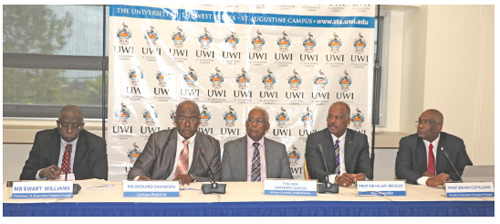 |
 |
 |
|
April 2018
|
He shared his vision for creating a culture of innovation and entrepreneurship as the Campus responds to the changing mandate for education, declining economies and a need for strategic but practical approaches to revitalizing the Caribbean. “For developing nations to get ahead, efforts must go beyond education and training to better equip citizens to use new technologies developed elsewhere. Our national education systems must also seek to strengthen the culture of research that leads to export entrepreneurship and innovation. By its very definition, innovation, through the “newness” of what is produced, enhances competitiveness,” he wrote in the Report. “Our position has always been that cuts in education do not heal. We will give as much as our resources will allow and will always be here to help sustain The University of the West Indies. In the past ours has been one of the regional governments that has made its contributions on time. We have faltered a bit over the last year or two but I want to give the assurance to the University community that we have a commitment not only to support the university but to ensure that our support is given on time,” he said. Annual report highlights covered major advancements from each Faculty in offering these practical solutions during the review period. They included:
In his final address as Chair of the St. Augustine Campus Council, Mr. Ewart Williams, noted that the campus has managed the financially difficult times admirably, remaining resilient and firmly committed to doing more with less. “Universities worldwide are engine rooms for game changing technologies and processes, and it is time that our University is seen as a key player in our national diversification strategy. To advance this process, however, there is a critical need for more research funding from Government as well as from the local private sector. I also support the lament made by Principal Copeland in a recent Conference on Diversification, “that the local private sector has not sufficiently taken advantage of the capabilities existing at the University by supporting the relationship between research, product development and entrepreneurship,” he wrote in the Report. (Terri-Ann Thompson) |


 The UWI St. Augustine hosted its 2018 Campus Council Meeting on March 20. Pro Vice-Chancellor and Campus Principal Professor Brian Copeland presented highlights of the 2016-2017 Annual Report under the theme Matta Season which represents critical shifts in focus as the Campus navigates a prolonged testing season.
The UWI St. Augustine hosted its 2018 Campus Council Meeting on March 20. Pro Vice-Chancellor and Campus Principal Professor Brian Copeland presented highlights of the 2016-2017 Annual Report under the theme Matta Season which represents critical shifts in focus as the Campus navigates a prolonged testing season.